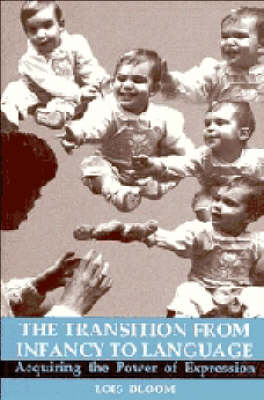
The Transition from Infancy to Language
Acquiring the Power of Expression
Seiten
1993
Cambridge University Press (Verlag)
978-0-521-44031-8 (ISBN)
Cambridge University Press (Verlag)
978-0-521-44031-8 (ISBN)
- Titel erscheint in neuer Auflage
- Artikel merken
A study of how developments in language, cognition, and emotional expression integrate in the process of early development.
In this important volume, Lois Bloom brings together the theoretical and empirical work she has carried out on early lexical development. Its focus is on the expressive power children acquire as they begin to talk and, in particular, on contributions from cognitive development, affect expression, and the social context for making the transition from prelinguistic expression to the expression of contents of mind. The first half of the book reviews the developments in infancy that enable the emergence of language and presents the theoretical perspective required for an understanding of the longitudinal study described in the second half. The book's main thesis is that language is acquired for expressing contents of mind and that its usefulness as a 'tool' is of only secondary importance. The Transition from Infancy to Language makes a major contribution to our knowledge of early lexical development, providing a persuasive theoretical model for researchers and students.
In this important volume, Lois Bloom brings together the theoretical and empirical work she has carried out on early lexical development. Its focus is on the expressive power children acquire as they begin to talk and, in particular, on contributions from cognitive development, affect expression, and the social context for making the transition from prelinguistic expression to the expression of contents of mind. The first half of the book reviews the developments in infancy that enable the emergence of language and presents the theoretical perspective required for an understanding of the longitudinal study described in the second half. The book's main thesis is that language is acquired for expressing contents of mind and that its usefulness as a 'tool' is of only secondary importance. The Transition from Infancy to Language makes a major contribution to our knowledge of early lexical development, providing a persuasive theoretical model for researchers and students.
Part I. Theory and Background: 1. The power of expression; 2. Representation and expression; 3. The emergent infant; 4. The expressive infant; 5. The transition to language; Part II. From Nine Months to Two Years: 6. Translation from theory to method; 7. Developments in expression; 8. Developments in affect expression; 9. Developments in word learning; 10. Developments in cognition; 11. Meaning and expression.
| Erscheint lt. Verlag | 26.11.1993 |
|---|---|
| Verlagsort | Cambridge |
| Sprache | englisch |
| Maße | 160 x 237 mm |
| Gewicht | 787 g |
| Themenwelt | Geisteswissenschaften ► Philosophie ► Sprachphilosophie |
| Geisteswissenschaften ► Psychologie ► Entwicklungspsychologie | |
| ISBN-10 | 0-521-44031-9 / 0521440319 |
| ISBN-13 | 978-0-521-44031-8 / 9780521440318 |
| Zustand | Neuware |
| Haben Sie eine Frage zum Produkt? |
Mehr entdecken
aus dem Bereich
aus dem Bereich
Macht und Legitimität politischer Sprache im Prozess der europäischen …
Buch | Softcover (2023)
Nomos (Verlag)
CHF 103,60
Wie die Menschheit zu ihrer größten Erfindung kam
Buch | Softcover (2022)
C.H.Beck (Verlag)
CHF 25,20


